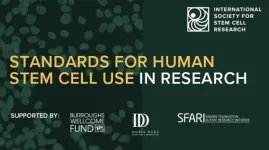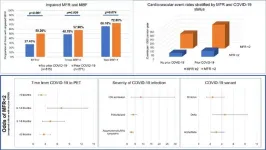(Press-News.org) Chatbots are increasingly becoming a part of health care around the world, but do they encourage bias? That’s what University of Colorado School of Medicine researchers are asking as they dig into patients’ experiences with the artificial intelligence (AI) programs that simulate conversation.
“Sometimes overlooked is what a chatbot looks like – its avatar,” the researchers write in a new paper published in Annals of Internal Medicine. “Current chatbot avatars vary from faceless health system logos to cartoon characters or human-like caricatures. Chatbots could one day be digitized versions of a patient’s physician, with that physician’s likeness and voice. Far from an innocuous design decision, chatbot avatars raise novel ethical questions about nudging and bias.”
The paper, titled “More than just a pretty face? Nudging and bias in chatbots”, challenges researchers and health care professionals to closely examine chatbots through a health equity lens and investigate whether the technology truly improves patient outcomes.
In 2021, the Greenwall Foundation granted CU Division of General Internal Medicine Associate Professor Matthew DeCamp, MD, PhD, and his team of researchers in the CU School of Medicine funds to investigate ethical questions surrounding chatbots. The research team also included Internal medicine professor Annie Moore, MD, MBA, the Joyce and Dick Brown Endowed Professor in Compassion in the Patient Experience, incoming medical student Marlee Akerson, and UCHealth Experience and Innovation Manager Matt Andazola.
“If chatbots are patients’ so-called ‘first touch’ with the health care system, we really need to understand how they experience them and what the effects could be on trust and compassion,” Moore says.
So far, the team has surveyed more than 300 people and interviewed 30 others about their interactions with health care-related chatbots. For Akerson, who led the survey efforts, it’s been her first experience with bioethics research.
“I am thrilled that I had the chance to work at the Center for Bioethics and Humanities, and even more thrilled that I can continue this while a medical student here at CU,” she says.
The face of health care
The researchers observed that chatbots were becoming especially common around the COVID-19 pandemic.
“Many health systems created chatbots as symptom-checkers,” DeCamp explains. “You can go online and type in symptoms such as cough and fever and it would tell you what to do. As a result, we became interested in the ethics around the broader use of this technology.”
Oftentimes, DeCamp says, chatbot avatars are thought of as a marketing tool, but their appearance can have a much deeper meaning.
“One of the things we noticed early on was this question of how people perceive the race or ethnicity of the chatbot and what effect that might have on their experience,” he says. “It could be that you share more with the chatbot if you perceive the chatbot to be the same race as you.”
For DeCamp and the team of researchers, it prompted many ethical questions, like how health care systems should be designing chatbots and whether a design decision could unintentionally manipulate patients.
There does seem to be evidence that people may share more information with chatbots than they do with humans, and that's where the ethics tension comes in: We can manipulate avatars to make the chatbot more effective, but should we? Does it cross a line around overly influencing a person's health decisions?” DeCamp says.
A chatbot’s avatar might also reinforce social stereotypes. Chatbots that exhibit feminine features, for example, may reinforce biases on women’s roles in health care.
On the other hand, an avatar may also increase trust among some patient groups, especially those that have been historically underserved and underrepresented in health care, if those patients are able to choose the avatar they interact with.
“That's more demonstrative of respect,” DeCamp explains. “And that's good because it creates more trust and more engagement. That person now feels like the health system cared more about them.”
Marketing or nudging?
While there’s little evidence currently, there is a hypothesis emerging that a chatbot’s perceived race or ethnicity can impact patient disclosure, experience, and willingness to follow health care recommendations.
“This is not surprising,” the CU researchers write in the Annals paper. “Decades of research highlight how patient-physician concordance according to gender, race, or ethnicity in traditional, face-to-face care supports health care quality, patient trust, and satisfaction. Patient-chatbot concordance may be next.”
That’s enough reason to scrutinize the avatars as “nudges,” they say. Nudges are typically defined as low-cost changes in a design that influence behavior without limiting choice. Just as a cafeteria putting fruit near the entrance might “nudge” patrons to pick up a healthier option first, a chatbot could have a similar effect.
“A patient’s choice can't actually be restricted,” DeCamp emphasizes. “And the information presented must be accurate. It wouldn't be a nudge if you presented misleading information.”
In that way, the avatar can make a difference in the health care setting, even if the nudges aren’t harmful.
DeCamp and his team urge the medical community to use chatbots to promote health equity and recognize the implications they may have so that the artificial intelligence tools can best serve patients.
“Addressing biases in chatbots will do more than help their performance,” the researchers write. “If and when chatbots become a first touch for many patients’ health care, intentional design can promote greater trust in clinicians and health systems broadly.”
END
Do chatbot avatars prompt bias in health care?
Matthew DeCamp, MD, Ph.D., and other University of Colorado School of Medicine researchers are shining a light on artificial intelligence’s role — and appearance — in health care.
2023-06-06
ELSE PRESS RELEASES FROM THIS DATE:
Team develops smartphone app to enhance midwifery care in Tanzania
2023-06-06
An international research team from Tanzania and Japan created a smartphone app and conducted a pilot study of how the app might be used to improve midwives’ knowledge and skills in Tanzania. Their study focused on the app’s potential effects on the learning outcomes of midwives and birth preparedness of pregnant women in Tanzania.
The team’s work is published in the journal PLOS ONE on March 31, 2023.
“The smartphone app for midwives showed significant improvements in their learning outcomes, leading to better birth preparations for pregnant women in Tanzania. This study highlights the potential of leveraging technology ...
Webb telescope detects universe’s most distant organic molecules
2023-06-06
An international team of astronomers has detected complex organic molecules in the most distant galaxy to date using NASA’s James Webb Space Telescope.
The discovery of the molecules, which are familiar on Earth in smoke, soot and smog, demonstrates the power of Webb to help understand the complex chemistry that goes hand-in-hand with the birth of new stars even in the earliest periods of the universe’s history. At least for galaxies, the new findings cast doubt on the old adage that where there’s smoke, there’s ...
Breastfeeding for longer may be linked to better exam results in later life
2023-06-06
Children who are breastfed for longer appear to be more likely to gain slightly better results in their school GSCEs at age 16 compared with non-breastfed children, suggests a study published online in the journal Archives of Disease in Childhood.
The evidence of improved educational outcomes is still apparent even when various factors are taken into account such as people’s socio-economic status and their parents’ intelligence.
Previous studies have suggested that children breastfed for longer have improved educational outcomes later in life. However these are relatively scarce, and ...
Close contact intervention between a mother and her premature baby may reduce risk of mortality by almost a third
2023-06-06
A method of care involving skin-to-skin contact between a mother and her prematurely born or low birth weight baby appears to impact the child’s chances of survival significantly, suggests a study published online in the journal BMJ Global Health.
Starting the intervention within 24 hours of birth and carrying it out for at least eight hours a day both appear to make the approach even more effective in reducing mortality and infection, researchers found.
The method of care known as ‘Kangaroo mother care’ (KMC) involves an infant being carried, usually by the mother, in a sling with skin-to-skin contact ...
Defibrillators used in just 10 per cent of out of hospital cardiac arrests - study shows
2023-06-06
Defibrillators are being used in just one in ten cardiac arrests where the lifesaving devices are available, according to new research presented at the British Cardiovascular Society Conference in Manchester.
The research drew upon data from the East of England Ambulance Service and The Circuit, the national defibrillator network developed by the British Heart Foundation (BHF). The Circuit maps the location of defibrillators across the whole of the UK, so that emergency services can direct bystanders to the nearest defibrillator in the event of ...
Virtual blood vessel technology could improve heart disease care
2023-06-06
Patients with heart disease could benefit from less extensive interventions thanks to cutting-edge technology that creates 3D computer models of blood flow through the heart's arteries, according to research presented at the British Cardiovascular Society in Manchester.
When the research team trialled the VIRTUHeartTM technology with doctors treating heart attack patients, they found that using it would have changed the treatment of more than 20 per cent of patients. In many cases, it would have led to fewer patients undergoing an invasive procedure such ...
The ISSCR releases global standards to enhance rigor and reproducibility of stem cell research
2023-06-06
The International Society for Stem Cell Research (ISSCR) today released the ISSCR Standards for Human Stem Cell Use in Research, an international collaboration aimed at enhancing rigor in preclinical research and ultimately strengthening the pipeline of therapies for patients.
“This nearly two-year initiative is groundbreaking for the global stem cell research community,” said Haifan Lin, ISSCR president. “The international standards will make a big difference in the quality of science that is performed and published worldwide.”
The ISSCR is the preeminent international stem cell research society with a reputation ...
Childhood maltreatment predicts adult emotional difficulties
2023-06-06
Have you ever wanted to convey a feeling but just couldn’t find the right words? Millions of people struggle with a personality trait known as alexithymia, which means “no words for feelings.” Individuals with alexithymia have difficulty identifying and describing their emotions. This trait can harm their social and intimate relationships. They are likely to miss social cues and thus fail to recognize or understand the feelings of others. Past research has suggested that a history of child maltreatment could play a role in developing adult alexithymia.
A new meta-analysis published this month in Psychological Bulletin, led by Stanford ...
New analysis shows COVID variant and severity of illness influence cardiac dysfunction, a key indicator of long COVID
2023-06-06
Patients infected with beta and delta COVID-19 variants, and those who required hospital stays for COVID-19 infection, were more likely to experience heart issues associated with long COVID, according to a recent Houston Methodist study published in the European Heart Journal – Cardiovascular Imaging. Patients recovering from the omicron variant were least likely to have microvascular involvement.
“This new data expands our understanding of myocardial flow reserve as an important prognostic marker in general and specifically in COVID-19,” said Mouaz Al-Mallah, M.D., corresponding author of the study and director of cardiovascular ...
Renowned sociologist and Black Voices Quintet set to dazzle at HDR UK’s Black Internship Programme Opening Ceremony 2023
2023-06-05
Contact: Clare Leahy clare.leahy@hdruk.ac.uk 07748016062
Event registration for press: https://bit.ly/45rIQBr
Health Data Research UK (HDR UK) is launching its Health Data Science Black Internship Programme for the third year running at its Opening Ceremony on Wednesday 21 June from 12-5pm at the Curzon Building in Birmingham City University.
The programme, run in partnership with the UK Health Data Research Alliance and 10,000 Black Interns is helping to tackle the underrepresentation of Black people within science, technology, engineering, and mathematics ...
LAST 30 PRESS RELEASES:
Yale study challenges notion that aging means decline, finds many older adults improve over time
Korean researchers enable early detection of brain disorders with a single drop of saliva!
Swipe right, but safer
Duke-NUS scientists identify more effective way to detect poultry viruses in live markets
Low-intensity treadmill exercise preconditioning mitigates post-stroke injury in mouse models
How moss helped solve a grave-robbing mystery
How much sleep do teens get? Six-seven hours.
Patients regain weight rapidly after stopping weight loss drugs – but still keep off a quarter of weight lost
GLP-1 diabetes drugs linked to reduced risk of addiction and substance-related death
Councils face industry legal threats for campaigns warning against wood burning stoves
GLP-1 medications get at the heart of addiction: study
Global trauma study highlights shared learning as interest in whole blood resurges
Almost a third of Gen Z men agree a wife should obey her husband
Trapping light on thermal photodetectors shatters speed records
New review highlights the future of tubular solid oxide fuel cells for clean energy systems
Pig farm ammonia pollution may indirectly accelerate climate warming, new study finds
Modified biochar helps compost retain nitrogen and build richer soil organic matter
First gene regulation clinical trials for epilepsy show promising results
Life-changing drug identified for children with rare epilepsy
Husker researchers collaborate to explore fear of spiders
Mayo Clinic researchers discover hidden brain map that may improve epilepsy care
NYCST announces Round 2 Awards for space technology projects
How the Dobbs decision and abortion restrictions changed where medical students apply to residency programs
Microwave frying can help lower oil content for healthier French fries
In MS, wearable sensors may help identify people at risk of worsening disability
Study: Football associated with nearly one in five brain injuries in youth sports
Machine-learning immune-system analysis study may hold clues to personalized medicine
A promising potential therapeutic strategy for Rett syndrome
How time changes impact public sentiment in the U.S.
Analysis of charred food in pot reveals that prehistoric Europeans had surprisingly complex cuisines
[Press-News.org] Do chatbot avatars prompt bias in health care?Matthew DeCamp, MD, Ph.D., and other University of Colorado School of Medicine researchers are shining a light on artificial intelligence’s role — and appearance — in health care.




